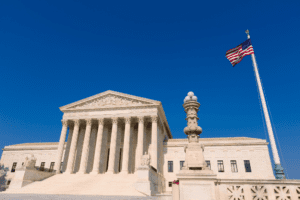 The dissent continued: And the degree of scrutiny we apply often depends on the type of speech burdened and the severity of the burden. See, e.g., Arizona Free Enterprise Club’s Freedom Club PAC v. Bennett, 564 U. S. 721, 734 (2011) (applying strict scrutiny to laws that burden political speech); Ward v. Rock Against Racism, 491 U. S. 781, 791 (1989) (applying intermediate scrutiny to time, place, and manner restrictions); Central Hudson Gas & Elec. Corp. v. Public Serv. Comm’n of N. Y., 447 U. S. 557, 564–566 (1980) (applying intermediate scrutiny to laws that burden commercial speech).
The dissent continued: And the degree of scrutiny we apply often depends on the type of speech burdened and the severity of the burden. See, e.g., Arizona Free Enterprise Club’s Freedom Club PAC v. Bennett, 564 U. S. 721, 734 (2011) (applying strict scrutiny to laws that burden political speech); Ward v. Rock Against Racism, 491 U. S. 781, 791 (1989) (applying intermediate scrutiny to time, place, and manner restrictions); Central Hudson Gas & Elec. Corp. v. Public Serv. Comm’n of N. Y., 447 U. S. 557, 564–566 (1980) (applying intermediate scrutiny to laws that burden commercial speech).
Additionally, beyond the right to freedom of speech, we regularly use means-end scrutiny in cases involving other constitutional provisions. See, e.g., Church of Lukumi Babalu Aye, Inc. v. Hialeah, 508 U. S. 520, 546 (1993) (applying strict scrutiny under the First Amendment to laws that restrict free exercise of religion in a way that is not neutral and generally applicable); Adarand Constructors, Inc. v. Peña, 515 U. S. 200, 227 (1995) (applying strict scrutiny under the Equal Protection Clause to race-based classifications); Clark v. Jeter, 486 U. S. 456, 461 (1988) (applying intermediate scrutiny under the Equal Protection Clause to sex-based classifications); see also Virginia v. Moore, 553 U. S. 164, 171 (2008) (“When history has not provided a conclusive answer, we have analyzed a search or seizure in light of traditional standards of reasonableness”). The upshot is that applying means-end scrutiny to laws that regulate the Second Amendment right to bear arms would not create a constitutional anomaly. Rather, it is the Court’s rejection of means-end scrutiny and adoption of a rigid history-only approach that is anomalous.
A focus on history or “the original intent of the Constitution’s framers” is the preferred tool of “conservative” justices. The late Justice Scalia was well-known for this analytical focus. A critique of that approach is that the framers were not all-knowing and failed to address slavery, women’s suffrage, and a host of other issues that should have been addressed.
